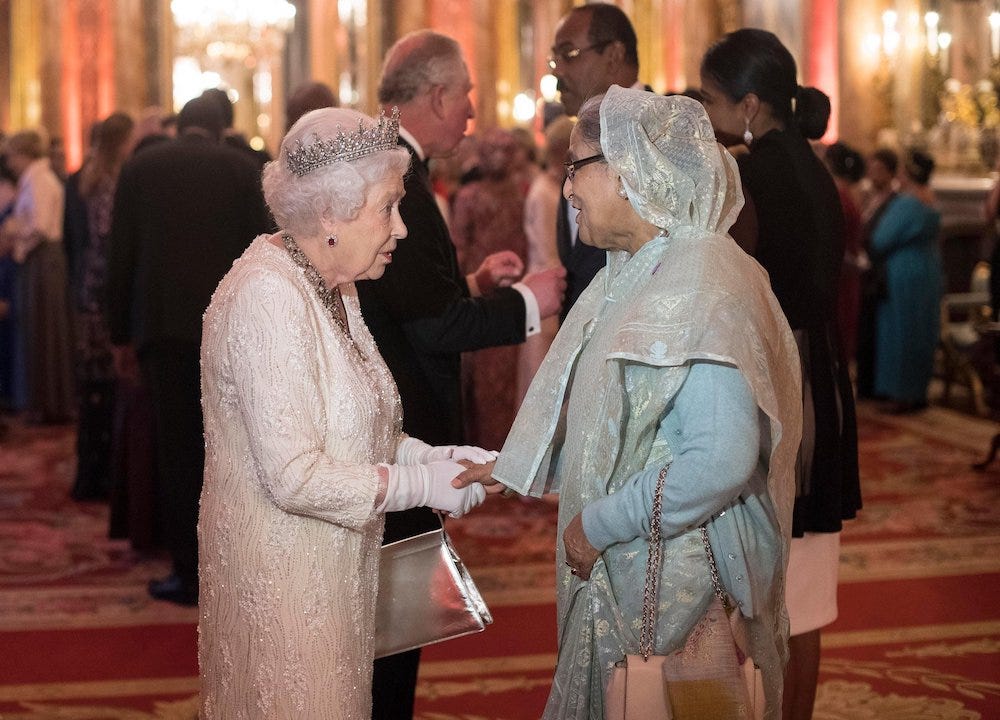
On March 1st, a week before International Women’s Day, the Commonwealth posted a video of its Secretary General asking the following question:
“#CommonwealthDay takes place on 8 March, the same day as International Women’s Day. So we want to know which woman has inspired YOU in your life or during COVID-19?”
She then answered it by stating that she:
“would like to name three phenomenal leaders in out Commonwealth”
These were Jacinda Arden, the prime minister of New Zealand, Mia Mottley, the prime minister of Barbados and Sheikh Hasina, the prime minister of Bangladesh.
Why?
Well it should be noted that these are the only three women leaders in the commonwealth, and so it would have been rather undiplomatic to have left any one of them out of praise on international women’s day!
But that, of course, was not what the Secretary General said. She stated:
“For their leadership during Covid-19, in their roles in their respective countries. All three, alongside so many other women, have given me hope for a world that delivers a common future for women and men and serves all of our common good.”
In a subsequent statement made on International Women’s Day itself, the Secretary General again mentioned the three women leaders:
“Notably, throughout this crisis, I have been impressed by the leadership demonstrated by female heads of government in the Commonwealth. Prime Ministers Mia Mottley of Barbados, Sheikh Hasina of Bangladesh and Jacinda Ardern of New Zealand have all been rightly lauded for their able handling of the crisis, marked by coordinated action as well as compassion.”
Human Right Watch (HRW)| has today released a letter which it wrote to the Commonwealth Secretary General asking her to explain why she termed Sheikh Hasina “phenomenal” or indeed praised her at all as a leader. The letter opens by saying:
We write to you with deep concern over your recent statements praising Bangladesh Prime Minister Sheikh Hasina. Prime Minister Hasina has presided over an increasingly authoritarian, near- one-party state where the state authorities have carried out extrajudicial killings, disappearances, and torture with impunity, while threatening and arresting critics in the media, civil society and opposition for peaceful speech.
It then went onto refer to the particular timing of the comments — just days after death of the writer Mushtaq Ahmed in jail:
Your praise came just days after the 25 February death of dissident writer Mushtaq Ahmed in custody. Ahmed was arrested in May 2020 for posting on Facebook that healthcare workers needed more personal protective equipment. He had been held in pre-trial detention for nine months during which it has been credibly alleged he was subjected to torture. After a public outcry, cartoonist Ahmed Kabir Kishore was granted bail soon after Ahmed’s death. He described suffering severe torture after he was taken into custody and also said that Ahmed had been brutally beaten.
It remains particularly unclear why Sheikh Hasina should be praised for her performance over Covid-19. It is the case that Bangladesh has (it appears) fared better in terms of rates of death — particularly compared to what was expected — but this has nothing to do with decisions made by the prime minister. The low death rates appear to be a South Asian phenomenon; Bangladesh’s rates are about the same as Pakistan, twice the level of Sri-Lanka and half the level of India — but all these countries have rates of death far lower than Europe and the USA. It is quite possible that people in South Asian may have had immunological advantage or there could be some other factor as set out in this excellent article in the New Yorker. Basically, the government of Bangladesh took a relatively laissez faire attitude to the virus — apart from schools being closed, most people have been living pretty normal lives for quite some months. This could have been disastrous — but Bangladesh was lucky.
And Bangladesh is fortunate again to have been given large quantities of the vaccine by India. By all accounts, its distribution to the urban middle class is efficient. But that is about all that can be lauded.
Moreover, the government did everything it could to minimise the reporting of cases and the level of deaths. Testing was restricted, and deaths were only reported as Covid deaths if they tested positive for the virus before they died. Most people, who died from Covid would have died at home. So we have no idea about the real level of Covid-19 deaths in Bangladesh.
The HRW letter makes a separate point about the inappropriateness of praising the Bangladesh prime minister in relation to Covid.
The Bangladesh government’s response to Covid-19 has been to use the pandemic as a pretext to further censor free speech and the media, threaten academic freedom, and arrest artists, students, doctors, political opposition members, and activists for speaking out about the government’s handling of the pandemic. This is neither compassionate nor inspiring.
The HRW ends its letter by asking the Commonwealth Secretary General to clarify the criteria she used in making her remarks — and noting how harmful such unmerited comments are:
We are therefore puzzled about the criteria you used to conclude that Prime Minister Hasina should be lauded for her leadership and singled out as an inspiring figure. As you know, this kind of notoriety has the effect of providing individuals such as Hasina with undeserved status, which is then used to increase domestic legitimacy and to ignore or even silence critics.
It will be interesting to see how the Commonwealth responds.
But, I think we can put it down to Hasina currently being one of the three Woman leaders of the commonwealth — and the secretary general not wanting to leave any one of them out of her praise.
